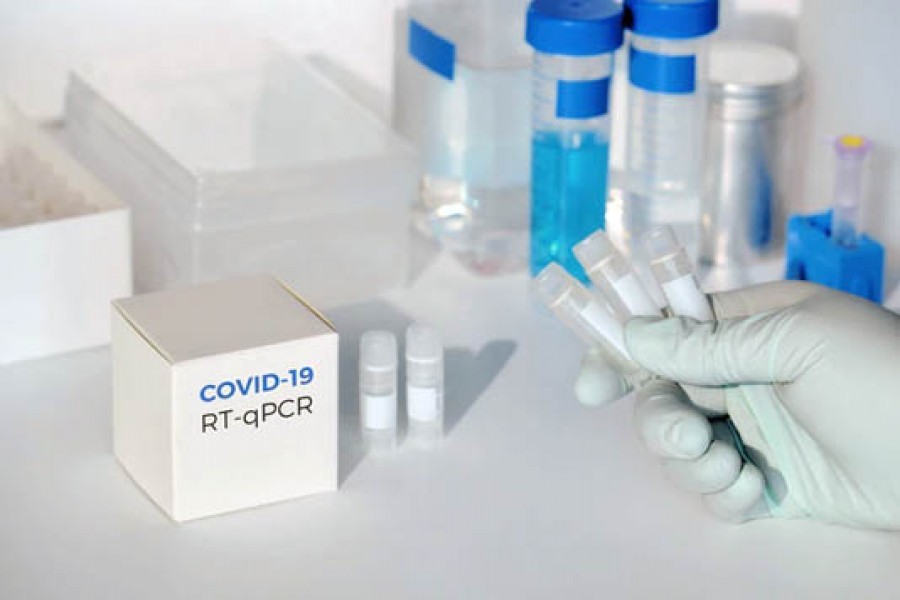Shortage of medical technologists, logistics hampering fight against pandemic

Published :
Updated :

Although the government is trying to gradually ramp up the country’s testing capacity to contain the coronavirus outbreak, health experts said the shortage of medical technologists and logistics are hampering efforts leading to testing backlog.
They also said they are facing difficulties in properly collecting samples, preserving and testing those for lack of adequate virologists and necessary equipment, affecting the quality of the collected samples as well as tests sometimes.
Amid such a shortfall, 30 samples, found to be positive in tests conducted in Jashore and Kushtia, turned out to be negative in further tests carried out in Dhaka recently, raising serious concerns over the capability of labs set up at the district level.
The health experts said semiskilled technologists are working at different labs set up outside Dhaka since there has been no recruitment of medical technologist for a long time.
As the government has taken an initiative for recruiting 2,000 doctors and 5,054 nurses on an emergency basis to tackle the coronavirus situation, they said it should also recruit an adequate number of medical technologists and thus contain the virus by enhancing the testing capacity.
Bangladesh falls behind in maintaining the minimum threshold of doctors, nurses and medical technologist for every 10,000 population as set by the World Health Organization (WHO).
According to WHO guidelines, there should have at least three nurses and five medical technologists against one doctor.
As per official data, 25,615 physicians are currently employed with government facilities while only 5,184 medical technologists and 1,417 lab technologists are now working under the Directorate General of Health Services (DGHS). But the country should have 128,075 medical technologists to maintain the WHO standard.
Talking to UNB, Prof Dr Sultana Shahana Banu, head of the virology department of the Dhaka Medical College (DMC), said the laboratories designated for the coronavirus tests are facing problems at every step -- from collecting samples to testing -- due to shortage of adequate and skilled manpower and relevant logistics.
“No medical technologist was appointed to government hospitals in the last one decade. The country only has a few virologists and they have been working relentlessly with the help of other doctors (non-virologists) to tackle the current situation,” she said.
Shahana said policymakers should now think about immediately introducing post-graduation course in virology at different government medical colleges to produce the skilled virologists. “The policymakers feel the importance of virologists whenever any virus hits the country, but unfortunately they forget it once the virus comes under control.”
She said coronavirus will hopefully be contained or eliminated within the next few months, but naturally another novel virus may evolve and cause pandemic in the future. “We need to keep this in mind and get ready to tackle it by producing sufficient virologists and creating posts for them as we know prevention is better than cure.”
Dr Shahana said she has already submitted an application to the authorities concerned for getting permission to start MD in virology (residency) post-graduation course at DMC to produce more specialised doctors in the subject concerned to meet the growing demand of virologists in the country.”
She said Dhaka Medica College now needs more virologists and technologists for conducting the Covid-19 tests, but three of their technologists were transferred to Gazipur last week, putting a severe strain on its lab.
Besides, the virologist said, only one real-time RT-PCR Machine has been installed at the DMC’s virology lab having the highest capacity of conducting 188 tests in a day. “But we’ve to collect more than 300 samples every day to cope with the pressure of patients. First of all, we don’t have enough manpower to smoothly collect these samples. Secondly, we need to store the collected samples in -80 degrees Celsius. But we don’t have such a sophisticated refrigerator for properly preserving the samples. That’s why the quality of samples can degrade sometimes which can affect the results of tests.”
Asked the reason behind some contradictory results of Covid-19 test, Shahana said, “Sample collection is an important matter for proper test results. We collect samples from nose and throat. We have shortage of skilled manpower to collect the samples. You may get report of false positive and false negative results for not properly collecting and preserving the samples.”
She said they are also facing problems in performing their duties for lack of both manpower and logistic support. “We need quality PPE and N-95 masks to protect healthcare personnel from getting infected with the virus.”
Dr ASM Alamgir, the Principal Scientific Officer (PSO) at the Institute of Epidemiology Disease Control and Research (IEDCR), said the recruitment of medical technologist has remained stopped for a long time due to legal complications.
“But the government has taken an initiative to recruit 350 medical technologists very soon to minimise a bit the shortage of skilled lab technologists,” he said.
Alamgir said they are facing problems in handling the pressure of Covid-19 testing with limited capacity. “We’ve very few virologists while microbiologists are now working at our laboratories to deal with the situation,” Alamgir said.
About the contradictory results of some Covid-19 tests at Kushtia and Jashore Labs, he said many technologists who are working now are not used to working with PCR machines. “So, whenever they doubt any test results and they send the samples to the IEDCR for crosscheck. But there’s nothing to be worried about it as such cases are very few.”


 For all latest news, follow The Financial Express Google News channel.
For all latest news, follow The Financial Express Google News channel.